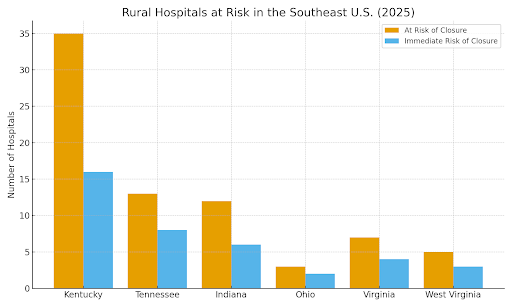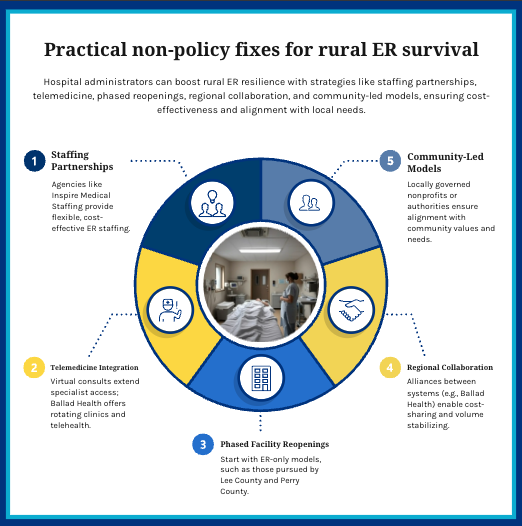How to Protect Rural Healthcare: Winning the Fight Against Medicaid Cuts
Chapters
In the rolling hills of Eastern Kentucky, it's all too common for ambulances to embark on treacherous drives exceeding 60 miles to reach the nearest emergency room. For rural residents across Kentucky, Tennessee, Indiana, Ohio, Virginia, and West Virginia, these vast distances can mean the difference between life and death.
Emergency departments in these areas serve as the cornerstone of local healthcare. But Medicaid reimbursement cuts threaten this fragile infrastructure. With margins already razor-thin, any further squeeze can push rural hospitals past the breaking point. This post dives into how such cuts imperil rural ERs—and how local leaders, healthcare systems, and staffing agencies like Inspire Medical Staffing can help stem the crisis.
Medicaid Cuts: A Unique Threat to Rural ERs in the Southeast
Rural hospitals depend heavily on Medicaid, often serving communities where over 40% of patients rely on it. Unlike urban hospitals, rural facilities can’t offset reduced Medicaid payments with wealthier, commercially insured patients. This disparity leaves them especially vulnerable.
Today, dozens of rural hospitals in the Southeast face closure. Kentucky alone has around 35 hospitals at risk, many of them rural. Tennessee has about 13, Virginia has 7, Indiana has 12, Ohio has 3, and West Virginia has 5—all in danger of shutting their doors.
These aren’t just statistics—they’re healthcare deserts in waiting.

Systemic Impacts: ER Closures, Staffing Crises, and Healthcare Deserts
The loss of a rural ER triggers a domino effect:
- Longer travel times for emergencies, increasing mortality risk
- Overburdened regional hospitals, facing capacity surges
- Staff fatigue and burnout, due to understaffing and stretched hours
Since 2005, over 180 rural U.S. hospitals have closed, accelerating the erosion of care for millions.
Case Study: Lee County Community Hospital (Ballad Health)
Lee County Community Hospital, located in Pennington Gap, Virginia, exemplifies local resilience and strategic collaboration.
- The hospital, closed in 2013 following reimbursement challenges and unsafe coverage gaps, was reopened by Ballad Health in July 2021 as a 10-bed Critical Access Hospital (CAH), a rare comeback in rural healthcare.
- In its first year, the ER cared for over 10,000 patients, while the outpatient services served 13,000+ individuals.
- The facility offers 24/7 emergency services, diagnostic imaging (including CT), rotating specialty clinics, and telemedicine, boosting access without reinventing costly infrastructure.
Ballad Health’s model shows that with strategic planning and community backing, rural ERs can be rebuilt—and thrive.

Case Study: Perry County Community Hospital (BradenHealth)
In Linden, Tennessee, a long-closed Perry County Community Hospital signals renewed hope.
- BradenHealth acquired the shuttered facility on December 25, 2024, aiming to gut, rebuild, and restore full-service healthcare access to the region, as reported by WBBJ TV, Becker's Healthcare, and the Crockett Chronicle.
- Tennessee legislators have designated it a "necessary provider," clearing legal hurdles and enabling funding channels vital for rural sustainability, Brownsville States-Graphic.
The ongoing transformation promises to revitalize not just emergency care—but regional well-being and employment.
The Critical Role of Inspire Medical Staffing
When rural ERs struggle to recruit or retain qualified staff, Inspire Medical Staffing steps in with emergency medicine expertise:
- Flexible emergency staffing solutions (locum tenens, per diem, or temp-to-perm placements) restore and maintain 24/7 coverage.
- Burnout mitigation through reliable staffing translates to improved retention and performance.
- In one anonymized case at a Kentucky critical-access hospital following the retirement of the ER director, Inspire deployed two board-certified emergency physicians and an APP within under three weeks, resulting in a 30% reduction in patient transfers in just one quarter.
By delivering timely, reliable care teams, Inspire helps rural ERs function continuously even amid fiscal uncertainty.
Practical, Non‑Policy Solutions for Rural ER Survival
Even without major federal intervention, rural hospitals can adopt these proven strategies:

Image created with https://infograph.venngage.com/
These strategies enhance resilience and protect life-saving care delivery.
Conclusion – A Call to Rural Healthcare Leaders
Medicaid cuts are destabilizing rural emergency care—but rural ERs need not surrender to the shutdown.
Hospital administrators and staffing leaders can safeguard access through inventive staffing models, telehealth deployment, and purposeful reopenings. Inspire Medical Staffing is dedicated to partnering with rural hospitals to ensure no ER closes for lack of qualified emergency medicine professionals.
The health—and survival—of rural communities depends on the choices we make today. Let’s keep those ER doors open.
The fight isn’t over—it’s just beginning. Let’s win it.
Let’s talk about what these Medicaid changes mean for your hospital — and how to stay ahead.
About Inspire Medical Staffing
Inspire Medical Staffing connects mission-driven physicians with rural hospitals through local, long-term partnerships built on trust. With over 30 years of experience, a small hands-on team, and deep roots in underserved communities, Inspire helps hospitals grow with consistent, high-quality emergency staffing—without the paperwork chaos. Founded by emergency physician Dr. Jeffrey Jones, the company remains grounded in its values of quality, honesty, and balance, offering hospitals a dependable partner and physicians a fulfilling, sustainable career.
Subscribe
Let’s work together.
Categories
Straightforward staffing.



